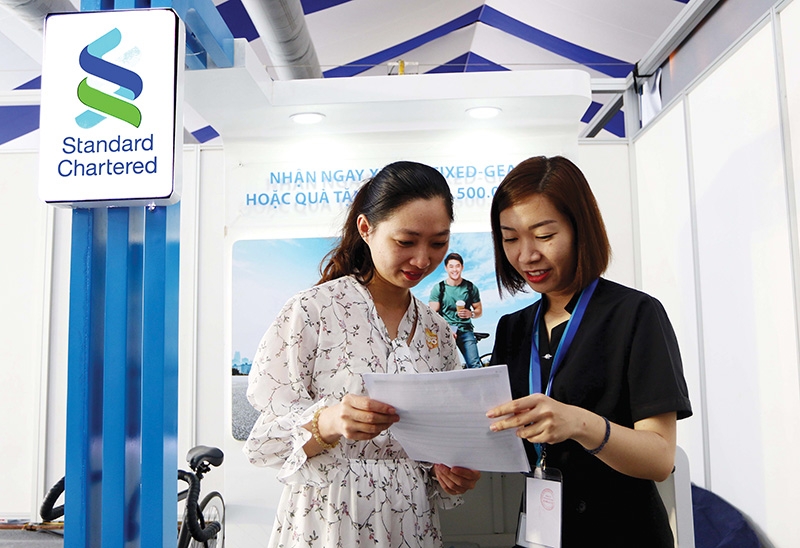Lenders at odds with supporting strategies
 |
| Standard Chartered has operated in Vietnam for over a hundred years |
The Vietnamese government has called on lenders to raise their tolerance for businesses effected by coronavirus (COVID-19), an attempt to ward off the signs of weaker economic growth.
Some local lenders such as SHB, Vietcombank, Agribank, and BIDV confirmed they would undertake relief measures for businesses which are particularly hard hit.
In particular, VPBank trimmed its lending rates by 1.5 per cent, targeting around 1,000 clients who have suffered during the outbreak.
Kien Long Bank cut its lending rates to 3 per cent to support customers in growing dragon fruit, watermelons, durian, mangoes, and bananas.
HDBank announced there would be no fee for international transactions for pharmaceutical and medical businesses, while ABBank is to allocate VND4 trillion ($174 million) for low-interest loans for vulnerable businesses during the epidemic.
The coronavirus contagion is showing how fragile agriculture, supply chains, and exports can be, and that they can be vulnerable to a whole range of risks. With close links in Asia, production could also be affected by supply chain disruptions due to delayed reopenings and deliveries by Chinese factories, as seen in the cases of Mazda, Toyota, and Nissan.
Elsewhere, banks offer financial relaxation to stimulate the economy. HSBC said it will offer more than $3.9 billion in additional liquidity to Hong Kong businesses pressured by the effects of the outbreak on the city’s economy. “We hope these measures will bring some relief to those who are under stress from the economic fallout of COVID-19, allowing them to focus on getting through these critical days without having to worry about their finances,” HSBC’s Hong Kong chief executive, Diana Cesar, said to the South China Morning Post.
The move came a week after the Bank of China became the first lender to roll out relief measures to help Hong Kong’s homeowners and businesses, offering interest-only payments on mortgages and loans to small- and medium-sized enterprises (SMEs).
The Industrial and Commercial Bank of China (ICBC) Asia would implement additional measures to help small businesses, including waiving fees and allowing SMEs to make interest-only payments on commercial mortgage loans for six months and to extend their loan-repayment cycles.
Standard Chartered, which also operates in Vietnam, said it would allow clients in Hong Kong with good repayment histories to make six months of interest-only mortgage payments and would offer a similar moratorium on principal payments for some commercial loans.
However, Standard Chartered Vietnam, HSBC Vietnam, and ICBC Vietnam, among others, are still playing the waiting game. It is highly likely there would be no additional liquidity measures, rate-cutting decisions, or tolerance to sour loans from overseas players.
Meanwhile, a representative from a Japanese bank in Hanoi said, “We do not have such a framework or special treatment for our corporate clients, mainly foreign-invested enterprises from Japan. Actually, I do not see any evidence that our customers’ businesses are in a crisis so far.”
Other foreign lenders in Vietnam such as Kookmin Bank, Shinhan Bank, and Hongleong Bank also currently seem to be reluctant to take pre-emptive actions.
What the stars mean:
★ Poor ★ ★ Promising ★★★ Good ★★★★ Very good ★★★★★ Exceptional
 Tag:
Tag:
Related Contents
Latest News
More News
- VNPAY and NAPAS deepen cooperation on digital payments (February 11, 2026 | 18:21)
- Vietnam financial markets on the rise amid tailwinds (February 11, 2026 | 11:41)
- New tax incentives to benefit startups and SMEs (February 09, 2026 | 17:27)
- VIFC launches aviation finance hub to tap regional market growth (February 06, 2026 | 13:27)
- Vietnam records solid FDI performance in January (February 05, 2026 | 17:11)
- Manufacturing growth remains solid in early 2026 (February 02, 2026 | 15:28)
- EU and Vietnam elevate relations to a comprehensive strategic partnership (January 29, 2026 | 15:22)
- Vietnam to lead trade growth in ASEAN (January 29, 2026 | 15:08)
- Japanese business outlook in Vietnam turns more optimistic (January 28, 2026 | 09:54)
- Foreign leaders extend congratulations to Party General Secretary To Lam (January 25, 2026 | 10:01)






















 Mobile Version
Mobile Version